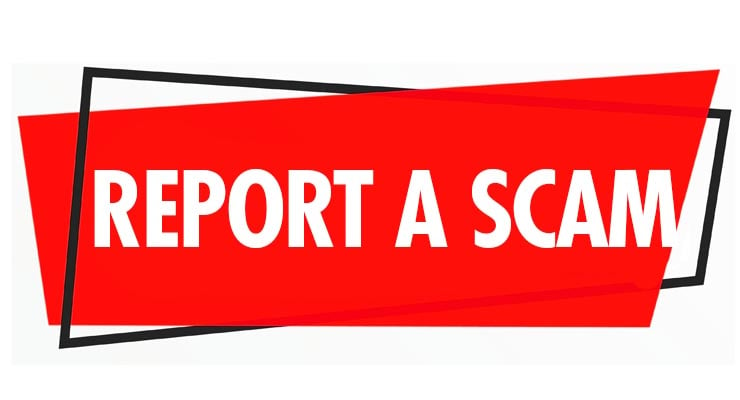Reporting – Scams pose a significant threat to individuals and society as a whole, but reporting them is a crucial step in combating fraud and protecting others from falling victim.
This blog post serves as a comprehensive guide on how to effectively report scams. By following the step-by-step instructions, utilizing essential resources, and adopting preventive measures, you can play a vital role in safeguarding yourself and assisting in the fight against scams.
- Gather Detailed Information: Before reporting a scam, gather as much information as possible. Note down the scammer’s name, contact details, and any communication records, including emails, messages, or phone call timestamps. Additionally, collect any supporting evidence, such as receipts, transaction records, or screenshots, to strengthen your report.
- Contact Local Law Enforcement: Start by reporting the scam to your local law enforcement agency. Provide them with a detailed account of the scam, along with the collected information and evidence. File an official report, as this helps authorities track and investigate the fraudsters. Be prepared to provide any additional information or updates as requested.
3 Report to Consumer Protection Agencies: Notify consumer protection agencies dedicated to combating scams. These organizations often have specialized units that handle scam reports and take appropriate action. Research and contact the relevant agencies in your country or region, providing them with the gathered information and supporting evidence.
4. Inform Financial Institutions: If the scam involved financial transactions or compromised your bank or credit card accounts, immediately contact your financial institutions. Inform them about the fraudulent activity and follow their guidance on protecting your accounts, disputing unauthorized transactions, and recovering any lost funds.
- Report to Online Platforms: If the scam occurred through an online platform, report it to the platform’s administrators or customer support. Provide a detailed description of the scam and attach any relevant evidence. Reporting the incident helps platforms identify and take action against scammers, preventing them from targeting others.
2 . Share with Scam Reporting Websites: Utilize scam reporting websites and databases to share your experience. These platforms serve as valuable resources for others to research and identify potential scams. Provide accurate information about the scam, including the scammer’s details, so that others can benefit from your report.
- Educate Others and Raise Awareness: Take an active role in educating others about scams. Share your experience with friends, family, and on social media platforms. Raise awareness about common scam tactics, red flags, and preventive measures. By sharing your story, you empower others to recognize and avoid scams, creating a safer environment for everyone.
- Stay Vigilant and Protect Yourself: While reporting scams is important, prevention is equally crucial. Stay vigilant and adopt preventive measures to protect yourself. Be cautious about sharing personal information, double-check before engaging in financial transactions, and stay updated on the latest scam trends through reputable source
Support Scam Prevention Initiatives: Consider supporting organizations and initiatives focused on scam prevention and victim support. Donate to reputable charities or volunteer your time to raise awareness, educate vulnerable populations, or assist scam victims in their recovery journey.
Reporting scams is a vital step in combating fraud, protecting yourself, and helping others stay safe. By following this comprehensive guide and utilizing available resources, you can effectively report scams to the appropriate authorities, prevent further fraud, and contribute to raising awareness.
Remember, your actions can make a significant difference in the fight against scams and in creating a safer environment for everyone. Stay informed, stay vigilant, and report scams promptly.
In conclusion,the prevalence of Bitcoin scams underscores the importance of vigilance and informed decision-making in the cryptocurrency market. Reporting scams involving Bitcoin is crucial to protect investors and deter fraudulent activities.
As Bitcoin gains popularity, so do various schemes aiming to exploit unsuspecting individuals. These scams range from fake investment platforms promising unrealistic returns to phishing attacks and Ponzi schemes. Each instance not only harms victims financially but also tarnishes the reputation of cryptocurrencies as a legitimate financial asset.
Reporting Bitcoin scams is essential for several reasons. First, it helps authorities and regulatory bodies investigate and take action against perpetrators, potentially preventing further victims. Second, it contributes to raising awareness among the public about common scam tactics and encourages caution when engaging in cryptocurrency transactions. Third, reporting scams contributes to the development of a safer and more secure environment for legitimate cryptocurrency investments and transactions.
To effectively report Bitcoin scams, individuals should gather as much evidence as possible, including transaction records, communications with scammers, and any other relevant documentation. Reporting can typically be done through local law enforcement agencies, financial regulatory bodies, or consumer protection agencies.
In conclusion, while Bitcoin and cryptocurrencies offer exciting opportunities, the presence of scams highlights the need for due diligence and awareness. By promptly reporting scams and staying informed, individuals can contribute to the integrity and longevity of the cryptocurrency market, ensuring it remains a viable and trustworthy avenue for financial transactions in the digital age.




2 Responses
Thank you for always trusting in us!.
http://www.ReclaimDc.com
Nice post!